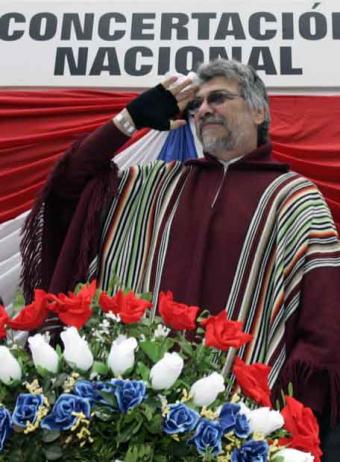Paraguay: Change is still to come; The first year of Fernando Lugo’s government

By Adolfo Giméne, translated by Federico Fuentes for Links International Journal of Socialist Renewal
August 14, 2009 – Asunción -- The anniversary of the first year of Fernando Lugo’s government coincided with a five-day national protest (August 10-15) organised by the United Popular Space (Espacio Unitario Popular, EUP), a coming together of many social organisations and left parties [1], with the support of figures from diverse political sectors, including the governor of the department of San Pedro, Jose Pakova Ledesma, from the Authentic Radical Liberal Party (Partido Liberal Radical Auténtico, PLRA). [Lugo was elected president on April 20, 2008, but did not formally take office until August 15.]
Indonesia: Parliament of the Streets demands free education and health care, housing for the poor
Photos and text by Ulfa Ilyas
On August 25, 2009, a demonstration was held in Jakarta, Indonesia, organised by the Parliament of the Streets Alliance at the inauguration of newly elected members of parliament. The protesters demanded free education for all citizens, free health programs, employment and housing programs for poor people.
Henri Anggoro, a leader of the Poor People’s Union (Serikat Rakyat Miskin Indonesia, SRMI), which organises in the sprawling shanty towns, said that experience has shown that parliament ignores the interests of the people. "They only represent the interests of a handful of people, rather than representing the people who elected them", he said.
Industrial action for peace: The Communist Party of Australia and antiwar activity before 1960
United States: Ted Kennedy -- The myth of the `liberal lion'

Ted Kennedy during his first campaign for US Senate in 1962.
By Lance Selfa
August 28, 2009 -- Democratic Party senator Ted Kennedy's political career reflects the course of US liberalism, from its heyday in the 1960s to its sorry state today.
For decades, Ted Kennedy was the bogeyman used by conservatives in their fundraising appeals to raise millions of dollars. To them, the liberal Kennedy seemed to represent everything they hated--there was no easier way to get a right-wing crowd booing and hissing than to mention Kennedy's name.
So it was more than a little jarring to hear conservatives sing Kennedy's praises for his "bipartisanship" in the wake of Kennedy's death from brain cancer on August 25.
"There is nobody else like him", Republican Senator Judd Gregg told the Associated Press. "If he had been physically up to it and been engaged on this [the current health-care reform debate], we probably would have an agreement by now."
Yeah, right.
Kanaky: Interview with jailed pro-independence trade union leader Gérard Jodar

This interview with Gérard Jodar, president of the pro-independence trade union federation USTKE (Union of Kanak and Exploited Workers), was published in Libération, issue #14790, on August 17 2009. He was interviewed by Matthieu Ecoiffier. Translated into English for Links International Journal of Socialist Renewal by Annolies Truman.
Sentenced at the end of June 2009 to a year in prison for ``hindering the circulation of an aircraft'' [click HERE for background information to the struggle], Gérard Jodar is one of very few trade unionists to be imprisoned in France –- and his lawyers’ application for a lesser sentence has just been rejected by the appeals judge of the Noumea Supreme Court.
Gérard Jodar explains the conditions of his detention as well as the situation on the ``Pebble’’ [the nickname for New Caledonia, the colonial name for the South Pacific territory of Kanaky, which remains a colonial possession of France -- translator].
The free-market fallacies of Ayn Rand

By Phil Hearse
United States: Race and class -- African Americans in a sick system

By Malik Miah
August 2009 -- The critical lack of quality and affordable health care is devastating for African Americans. Twice as likely as whites to go without health insurance, African Americans suffer chronic illnesses such as high blood pressure and diabetes at an escalating rate. The root of the problem is not inferior Black — or better white — health care. It is first and foremost a class issue, exacerbated for Blacks and Latinos because of the institutional racism that still permeates society.
Only the wealthy can afford “the best medical care in the world”. Everyone else’s care is rationed by the employer or private plans that each can afford to buy, or if uninsured, by the use of “free” clinics and emergency rooms. The debate over the broken US health-care system and what to do about it is one of life and death.
Stubborn facts
Honduras: Al Giordano -- `The people are organising creatively to topple the coup'
August 26, 2009, marks 60 days since Honduras' oligarchy overthrew the elected president of the country. As protests against the coup continue without let up, Western governments have refused to do anything concrete to support democracy, or as in the case of the US administration of President Barack Obama, been complicit.
The international corporate mass media has shunned providing coverage of the mass opposition in the streets of Tegucigalpa. This news blackout, and the resulting heightened state repression, has done little to deter the ongoing resistance to the coup inside Honduras.
New books reveal Friedrich Engels’ revolutionary life

Engels: A Revolutionary Life, by John Green, Artery Publications, 2008.
The false promise of energy efficiency and a real alternative

By Don Fitz
August 22, 2009 -- An action can have opposite effects, depending on it s social contexts. An isolated individual who protests company policy by refusing to go to work could well get fired and become an example used to intimidate others. When an entire workforce stays off the job, it’s called a “strike” and has a very good chance of forcing the company to change its policy.
As positive as they may be for friends and family, individual lifestyles of non-violence do not stop wars from being fought. But a society that eliminates corporate control of the economy gets rid of the need for expansion and takes an enormous step towards non-violence. In this context, non-violent lifestyles solidify non-violent global politics.
It is even more so with “energy efficiency”. It is impossible for individual choices to purchase energy-efficient products to have any positive effect on climate change. But, in a democratically run economy, energy efficiency would be a cornerstone of resolving the catastrophic legacy of production for profit.
Lucas Aerospace -- When workers said `no' to military production, `yes' to green jobs

By Rob Marsden
August 22, 2009 -- Socialist Resistance -- Today, the twin drivers of economic recession and the possibility of catastrophic climate change are beginning to push working people towards action. A series of small-scale but high-profile occupations of threatened factories, not just at Vestas wind turbine plant but also at Visteon car plant, where 600 workers took on the might of Ford and won a greatly enhanced redundancy package, show what is possible. In the 1970s workers at Britain's Lucas Aerospace went even further. We look back at the lessons of Lucas Aerospace.
It is clear that if we are to avert catastrophic climate change by moving rapidly to a low-carbon economy, certain industries will have to be wound down or drastically scaled back, for example, the power generation, aviation and car industries. However, rather than this leading to a net loss of jobs, efforts must be put into creating new green jobs or ``converting'' old jobs.
Honduras: pre-revolutionary situation? Situación pre revolucionaria?

By Ricardo Arturo Salgado, translated by Felipe Stuart Cournoyer
August 22, 2009 -- Pre-revolutionary situation? Some analyses of the situation in Honduras are fairly static. We have to differ with many local and foreign analysts who have tried to understand the situation in Honduras by imposing pre-existing parameters and by using basic concepts of the Marxist dialectic without any scientific criterion. Many have seen a failure of the Honduran grassroots resistance, failing to understand that historical materialism is not a mathematical formula where only variables change, but rather, a way to interpret reality objectively.